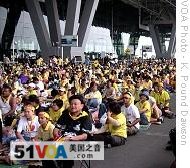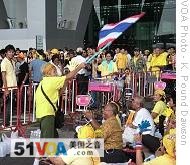Bangkok
12 January 2009
Thailand's central bank says the protests that closed Bangkok's airports late last year cost the country more than $8 billion. Some industries, such as from tourism and trade are still struggling to recover.
The Bank of Thailand study says the $8.5 billion loss exceeded the damage caused by the outbreak of Severe Acute Respiratory Syndrome (SARS), which hit Asia in 2003, or the damage wrought by the 2004 India Ocean tsunami.
 |
| Protesters at main international airport in Bangkok, 26 Nov 2008 |
The airport shutdown stranded hundreds of thousands of tourists, and kept others from coming into the country, at the start of the peak tourism season. But the economic costs went beyond the tourism sector, with logistics and trading companies hit hard.
One industry hurt was the multi-million dollar orchid export industry. Thailand is the world's leading orchid exporter with an 80 percent share of the global market. Orchid industry executives say the closure cost the sector over $9 million.
"Trucks are coming to the farm - and then off to the airport and lo and behold - airport closed," recalled Todd Banks, co-director of orchid export company, Thai Orchid Network. "All of those orchids had to be turned back to the farm, and, hello, of course once they're turned back you've just got to toss them. The orchids that were already within the airport - or any of the agricultural perishables - those had to be tossed as well."
Orchid exporters warn the closure could mean Thailand loses much of its market share.
Major airlines, especially hard hit by the closure, are seeking damages from the government. The airlines want compensation for such costs as having to set up alternative check-in facilities, hiring extra security and staff overtime.
Brian Sinclair-Thompson, president of the Thailand board of airline representatives, says the carriers have yet to get a response.
"Waiting on the response from the government and I fear it's probably going to fall between the cracks of the old and the new administrations," he said. "But we'll pursue within a couple of weeks to ask them for an update to our submissions, as it was them that invited us to submit the claim."
 |
| Elderly woman leads cheers during protest |
The Bank of Thailand report forecast tourist arrivals will fall by almost nine percent in 2009 to 12.8 million. The tourism industry is worth $16 billion and accounts for some six percent of gross domestic product.
At the time of the airport closure, hotels reported occupancy rates collapsing to 20 percent. They tried to reduce loses by heavy price discounting, closing floors and restaurants and laying off staff.
Tourism authorities estimate arrivals over the first six months of 2009 will fall by 2.5 million, costing the industry more than $3 billion in lost revenue. Before the airport closure, authorities had earlier forecast arrivals of 15.5 million in 2008.
But John Koldowski, a spokesman for the Pacific Asia Travel Association, says there are signs of recovery.
"Daily occupancy rates in hotels in Bangkok and Phuket ... both of those died dramatically through late November, December. But they are scratching their way back very slightly to where they should be this time of the year or thereabouts," Koldowski said.
However, Thailand's political landscape remains unsettled. In mid-December, the previous government was forced from office by a court ruling that coalition members had violated election laws. Democrat Party leader, Abhisit Vejjajiva, became the new prime minister.
But supporters of Mr. Thaksin, who lives in exile after being found guilty of corruption, have vowed to disrupt the government to force new elections. There are concerns that renewed protests could frighten away tourists and business investors.
To counter that, tourism authorities are planning new promotions to woo back visitors, and to reassure them Thailand is a safe destination.